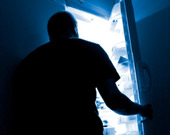 A large number of people report that they can eat well (i.e. healthfully) all day, only to sabotage themselves each evening with eating large amounts of food throughout the night. Many of these persons would qualify for Night Eating Syndrome. The following information is meant to clarify what can be involved with this disorder (herein referred to as NES).
A large number of people report that they can eat well (i.e. healthfully) all day, only to sabotage themselves each evening with eating large amounts of food throughout the night. Many of these persons would qualify for Night Eating Syndrome. The following information is meant to clarify what can be involved with this disorder (herein referred to as NES).
Characteristics of Night Eating Syndrome (NES)
- Night-Eating Syndrome (NES) is listed in the DSM-V manual under the category of “Other Specified Feeding or Eating Disorder” or “OSFED” (previously the EDNOS Category).
- It is characterized by recurrent episodes of night eating — awakening from sleep to eat or excessive food consumption after the evening meal.
- Night-eating persons typically skip breakfast or do not find themselves hungry until mid-day. Many experience guilt, shame, and/or anger associated with what was consumed the night before.
- The NES pattern is thought to be stress related and is often accompanied by depression. Once evening arrives the sufferer may find themselves to be tense, anxious, nervous and/or agitated. They often report having problems falling asleep and waking numerous times throughout the night at which they will eat.
- The NES behavior occurs throughout the evening hours and differs from binge eating in that it does not feature the consumption of large amounts of calories in a relatively short period of time.
- Typically NES involves consuming carbohydrates and sugar rich foods. It is possible the individual selects these type of foods because of their tendency to trigger the brain to produce neurochemicals that elevate mood. NES may be an attempt to self-treat stress and mood disorders.
- Statistically, the largest number of persons with NES are overweight by at least 100 pounds. NES is positively associated with obesity.
Night Eating Syndrome vs. Sleep Eating Syndrome
Night-Eating Syndrome is not to be confused with Nocturnal Eating Syndrome and/or Sleep Eating Syndrome. Persons with Nocturnal Eating Syndrome fall asleep and then experience a “sleep walk”-like state in which they appear to wake in the night, become fully aware, and then consume large amounts of calories. Often the person does not recall the event the next day.
What Do I Do Now?
As with all types of disordered eating, we strongly recommend that you seek out counsel from a therapist, doctor, or nutritionist. As noted above, NES is often associated with obesity, and can be a huge factor in a person not achieving a healthy weight for their body. For more information on how to find the help you need, read our article on Finding Treatment.
- Seek community and support.
- Consider taking one of our Lasting Freedom self-study courses (not a replacement for one-on-one care with a professional).
- Also, a particularly helpful book is Overcoming Night Eating Syndrome, by Kelly Allison Ph.D., Albert Stunkard, MD and Sara Thier.

